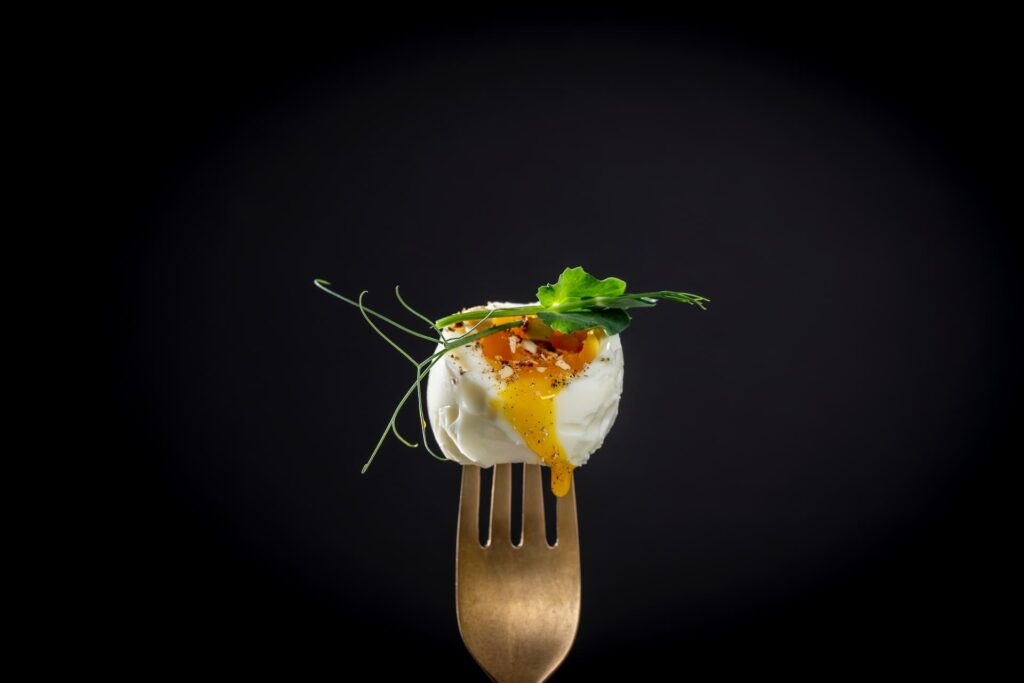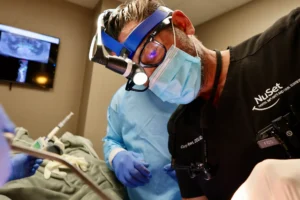If you’re considering dental implants or have just had the surgery, you’re likely curious about your diet during recovery.
Given the complexity of dental implant surgery, navigating post-operative care is vital for a smooth recovery and the success of the implant. It’s advisable to adhere to a soft food diet for the first 10 to 14 days after your dental implant surgery or until discomfort subsides.
Why Sticking with the Post-Operative Diet is Important
Following a strict diet after dental implant surgery is key for several reasons. First, the right foods can speed up healing by providing your body with the nutrients it needs. Eating soft, easy-to-chew foods is important because your mouth will be sensitive during this period, and hard or chewy foods can hurt and disrupt the healing process.
Sticking with the post-operative diet is also crucial for the implants to bond well with your jawbone, a process called osseointegration. This bonding is what makes the implants strong and long-lasting. So, choosing your post-surgery diet carefully helps ensure your recovery is as quick and successful as possible.
Foods to Avoid After Dental Implant Surgery
After getting dental implants, it’s important to avoid certain foods to prevent discomfort and complications. Here’s a list of foods and beverages to avoid:
- Avoid hard foods like nuts and crunchy foods, as these can hurt your healing gums.
- Chewy foods such as steak or candy that require a lot of chewing effort can also hurt your implant.
- Avoid sticky foods like gum and caramel. They can cling to and pull at the implant site.
- Spicy foods and very hot beverages may irritate the surgical area.
- Alcoholic drinks may slow down the healing process.
Staying away from these foods helps protect your new implants and ensures a smoother recovery.
Soft Liquid Diet Options to Help Your Healing
Following dental implant surgery, opting for a soft liquid diet can greatly aid in your recovery. This diet includes:
- Smoothies: Blend fruits with yogurt or milk for a nutritious smoothie. Avoid using fruits with seeds.
- Soups: Pureed or creamy soups without large chunks are gentle on your mouth.
- Broths: Nutrient-rich bone or vegetable broths can provide essential vitamins and minerals.
- Meal replacement shakes: If you cannot eat solid foods, these can offer a balanced mix of nutrients.
Choosing these liquid options helps keep you nourished while minimizing discomfort during the initial healing stage.
Chewable Soft Foods
Incorporating chewable soft foods is beneficial for a balanced recovery diet after dental implant surgery. Consider the following options:
- Mashed vegetables like potatoes or carrots are good for vitamins and fiber.
- Scrambled eggs, which are easy on your mouth and rich in protein.
- Soft fruits such as bananas require minimal chewing.
- Cooked cereals like oatmeal or grits which can be easily swallowed.
- Pasta and rice, cooked until very soft, are a good source of energy.
Including these foods in your diet ensures you get the necessary nutrients while avoiding strain on your healing mouth.
How to Get Enough Nutrition After Dental Implant Surgery Despite Dietary Restrictions

Following your dental implant surgery, you’ll likely be eager to enjoy your usual foods once again. But, it’s critical to consume suitable foods at each stage of your recovery and heed your dentist’s advice.
- Ensure you eat and drink consistently while healing from the dental implant operation. Regular nourishment is key to a faster recovery and improved overall well-being, providing you with essential nutrients and energy.
- Incorporate protein supplements into your diet if needed. Many patients find it challenging to consume adequate protein during recovery, so protein supplements can be a beneficial addition.
- Adhere to the recommended diet after your dental implant surgery. The initial days post-surgery can be uncomfortable. During this period, it is vital to stick to a soft diet designed for post-implant recovery to avoid disrupting the healing process.
- If you have diabetes, it is important to monitor your blood sugar levels regularly. Keep up with your usual eating patterns and closely track your glucose to prevent complications related to diabetes and reduce the risk of infection.
- For vegetarians or vegans, foods rich in protein, like soft-cooked lentils, tofu, or smooth nut butter, are available.
- Gluten-free options include mashed potatoes, rice dishes, and gluten-free pasta.
Exploring these alternatives ensures you maintain a balanced diet that accommodates your dietary needs while promoting healing.
Oral Hygiene Practices After Dental Implant Surgery
Taking care of your mouth after dental implant surgery is vital. Here are some tips:
- Gently brush your teeth around the implant site to keep it clean.
- Use a soft-bristled toothbrush and a non-alcoholic mouth rinse to avoid irritation.
- Avoid smoking, as it can delay healing and affect the success of the implant.
- Skip using a straw when drinking.
Following these oral hygiene practices helps ensure a smooth recovery and the long-term success of your dental implants.
Book a Dental Implant Consultation With Nuset Today!
At Nuset Dental Implants and Oral Surgery, our team is committed to providing exceptional care, ensuring you’re fully equipped for a smooth recovery after your dental implant procedure.
We offer comprehensive post-operative guidelines and advice on the best foods and beverages to aid in your healing journey. Contact us now to schedule a consultation.
Frequently Asked Questions
How long after dental implants can I eat normally?
The timeline for returning to normal eating varies from person to person, but typically, you can start reintroducing your regular diet about 6 to 8 weeks after surgery. However, full healing and osseointegration, where the implant fully bonds with your jawbone, can take 3 to 6 months. It’s essential to follow your dentist’s advice on when it’s safe to eat all types of foods again.
What foods should you avoid after dental implant surgery?
After dental implant surgery, it’s wise to avoid hard, crunchy, sticky, chewy, spicy, and extremely hot foods. These include nuts, seeds, hard candies, caramel, gum, popcorn, chips, steak, spicy dishes, and hot beverages. Such foods can disrupt the healing process, irritate the implant site, or dislodge the implant.
How can I speed up healing after dental implants?
To speed up your healing process, follow these tips:
- Keep the implant site clean by gently brushing and using any mouthwash your dentist recommends.
- Eat a balanced diet rich in vitamins and minerals that promote healing, like Vitamin C and calcium.
- Avoid smoking and drinking alcohol, as these can hinder the healing process.
- Follow all post-operative care instructions provided by your dentist, including taking prescribed medications.
- Rest adequately and avoid strenuous activities for the first few days after surgery.
How long should I rest after dental implant surgery?
It’s generally recommended to rest for at least 24 to 48 hours after dental implant surgery. During this time, try to keep your head elevated and limit any physical activity to reduce swelling and promote healing. However, the exact amount of rest needed can vary based on the complexity of the surgery and your overall health. Always follow the specific guidance provided by your dental surgeon.





